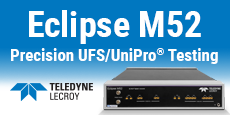QLogic Said 16Gb and 8Gb FC Adapters Outperform Competition
Benchmark by Demartek
This is a Press Release edited by StorageNewsletter.com on December 12, 2012 at 2:55 pmQLogic Corp. announced its 16Gb and 8Gb FC adapters outperform the competition according to the December 2012 FC HBA Evaluation Report issued by Demartek, LLC.
An independent research firm specializing in real-world, hands-on testing and analysis, Demartek validated the superior performance of the QLogic FlexSuite 2600 Series 16Gb FC adapter through a sequence of tests, including the TPC BenchmarkH TPC-H. TPC-H is an industry-standard, decision support benchmark that simulates broad business intelligence database environments most relevant to information systems that provide organizations with answers to critical business analytics.
Unlike competitive offerings, the high-availability architecture of QLogic FC adapters provides the secure and deterministically predictive scalability that data center administrators demand.
The evaluation report concluded:
- Compared to the nearest competitor’s 16Gb FC adapter available today, the QLogic FlexSuite 2600 Series dual-port 16Gb FC adapter outperforms in TPC-H queries by up to 133%, with overall TPC-H queries executing 16% faster.
- The QLogic 2500 Series dual-port 8Gb FC adapter outperforms the nearest rival 8Gb FC adapter by up to 120%, with overall TPC-H queries executing 17% faster.
- With its port-level isolation architecture, the dual-port QLogic 2600 Series 16Gb FC adapter provides independent port functionality for increased security and reliability, improved fault-tolerance, and predictable performance scalability. By comparison, the architecture of the nearest competitive offering does not provide port-level isolation, resulting in compromised physical security and scalability.
- The FlexSuite 2600 Series 16Gb FC adapter, using the same battle-hardened, FC driver stack as the widely deployed QLogic 8Gb FC adapter, delivers three times the transactions (1.2 million IOPs) and double the bandwidth as the 8Gb adapter. This same driver assures pain-free upgrades when moving to 16Gb FC.
- Moving from QLogic 8Gb FC to QLogic 16Gb FC improves TPC-H performance by up to 82%, and overall the TPC-H test completed 35% faster over the performance measurement period.
"Cloud computing, big data, and increased backup and recovery burdens are driving the need for higher storage bandwidth. FC storage area networks continue to be a key component of most large data center storage environments, with more than 75% of deployments today using dual-port adapters," said Dennis Martin, president, Demartek. "QLogic’s dual-port architecture has separate processor, memory and firmware for each port on the adapter which means that activity such as high I/O loads, resets, and recoveries that occur on one port do not impact the other port. Since each port on the QLogic adapter is able to achieve full line rate, independent of the activity of the other port, overall performance is increased significantly."
"FC continues to scale and deliver the ultimate performance and most reliable I/O connectivity for the data center," said Amit Vashi, VP, marketing, Host Solutions Group, QLogic. "With the world’s largest installed base of FC adapters, only QLogic delivers the essential HA architecture that provides the I/O foundation required for resilient enterprise data centers."
QLogic 16Gb FC Delivers Performance
The QLogic FlexSuite 2600 Series 16Gb FC adapter handles three times the transactions and double the throughput (6000MBps) of 8Gb FC, increasing application performance and cutting backup times in half. The 2600 Series adapters are optimized for performance in next-generation servers with support for the new PCIe 3.0 bus architecture. Unlike competitive offerings, the 2600 Series provides complete physical port-level isolation in dual-port configurations. With this architecture approach, each port has its own set of processor, memory and driver resources. While competitive designs must share these resources, compromising security and increasing latency, QLogic port-level isolation enables a secure, predictable and scalable architecture.












 Subscribe to our free daily newsletter
Subscribe to our free daily newsletter


